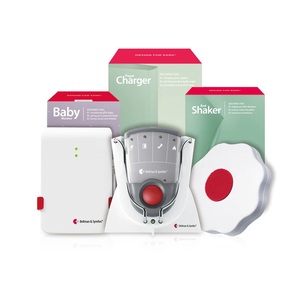Blog Information
- Posted By : busy trend
- Posted On : Aug 08, 2023
- Views : 89
- Category : Technology
- Description : The evolution of baby cry detection technology has transformed parenting, offering convenience, safety, and peace of mind.
- Location : United States
Overview
Introduction
Becoming a parent is a journey filled with joy, love, and a deep sense of responsibility. One of the primary concerns for any parent is ensuring the safety and well-being of their child, especially during moments when they are not physically present. This is where modern technology comes to the rescue, offering innovative solutions such as baby cry detection technology. In this blog post, we will explore the significance of baby cry detectors, their benefits, and how they are revolutionizing parenting, particularly for those with hearing impairments.
The Need for Baby Cry Detection Technology
A baby's cry is their primary means of communication, indicating various needs such as hunger, discomfort, or the need for attention. For parents, deciphering the meaning behind each cry can be both challenging and stressful, especially during the night or when they are in another room. This is where baby cry detection technology plays a pivotal role.
How Baby Cry Detection Technology Works
Baby cry detection technology is designed to identify and analyze the unique acoustic patterns of a baby's cry. Using advanced algorithms and sound recognition techniques, these systems can distinguish between different types of cries and alert parents accordingly. The technology can be integrated into various devices such as baby monitors, smartphones, and wearable devices.
Benefits of Baby Cry Detection Technology
-
Peace of Mind: Baby cry detectors provide parents with a sense of peace and assurance, allowing them to respond promptly to their baby's needs even when they are not physically present in the same room.
-
Early Intervention: By alerting parents as soon as their baby starts crying, these detectors enable early intervention. Addressing a baby's needs promptly can help prevent prolonged crying and alleviate potential discomfort.
-
Accessibility for the Deaf: Baby cry signalers are particularly invaluable for parents with hearing impairments. Traditional audio baby monitors may not be effective for these parents, but with visual or tactile alerts, they can stay attuned to their baby's needs.
-
Improved Sleep Patterns: Sleep deprivation is a common challenge for new parents. Baby cry detection technology allows parents to rest with confidence, knowing that they will be alerted when their baby requires attention.
-
Data Insights: Some advanced baby cry detectors offer features like cry pattern analysis over time. This can provide insights into a baby's sleep and crying patterns, aiding parents in establishing healthy routines.
Choosing the Right Baby Cry Detector
When selecting a baby cry detector, consider the following factors:
-
Accuracy: Opt for a device with reliable sound recognition technology to minimize false alarms.
-
Alert Mechanisms: Ensure the device offers multiple alert options, such as sound, visual cues, or notifications on a smartphone.
-
Compatibility: Check if the device is compatible with your existing technology, such as smartphones or smart home systems.
-
Range: Consider the range at which the device can detect your baby's cry. This is particularly important if you have a larger living space.
Conclusion
The evolution of baby cry detection technology has transformed parenting, offering convenience, safety, and peace of mind. Whether it's enhancing sleep quality or providing accessibility for parents with hearing impairments, these devices have become an essential tool for modern caregivers. As technology continues to advance, we can expect even more sophisticated features that will further improve the parenting experience.
-
